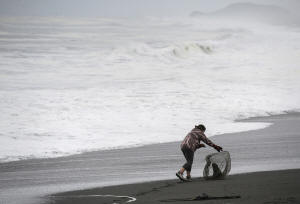|
The
global pact to conserve biodiversity on the high seas was
finally agreed in March and formally adopted by the United
Nations in June. It is seen as a crucial tool to meet a target
agreed last year to protect 30% of the earth's land and sea by
2030, known as "30 by 30".
At least 60 countries are expected to sign the agreement at the
annual United Nations General Assembly on Wednesday. However, it
still needs to be ratified on a national level before it goes
into effect.
Mads Christensen, interim executive director of Greenpeace
International, described the signings as a "powerful signal" and
help maintain momentum to meet the "30 by 30" target.
"But this signing is a purely symbolic moment," he said. "Now
politicians must bring the treaty home and ensure it is ratified
in record time."
The agreement will create ocean sanctuaries where fishing will
be prohibited, and also ensure human activity on the high seas
is subject to environmental impact assessments.
The International Union for the Conservation of Nature estimates
that $500 million in funding will be required to kickstart the
treaty, and a special implementation and capacity-building fund
could require another $100 million per year.
Threats to the ocean environment have been mounting in recent
years as a result of overfishing as well as rising temperatures,
and new threats could also emerge from ocean-bed mining and the
use of geoengineering technologies to boost the ocean's capacity
to absorb carbon dioxide.
Environmental groups say the treaty must be brought fully into
effect by 2025 at the latest to ensure the "30-by-30" protection
target is reached.
"The ocean can't wait, and with the treaty being in the making
for the better part of the past 20 years, there is absolutely no
time to waste," said Jessica Battle, an ocean expert with the
Worldwide Fund for Nature.
(Reporting by David Stanway in Singapore; Editing by Stephen
Coates)
[© 2023 Thomson Reuters. All rights
reserved.] Copyright 2022 Reuters. All rights reserved. This material may not be published,
broadcast, rewritten or redistributed.
Thompson Reuters is solely responsible for this content.

|
|




